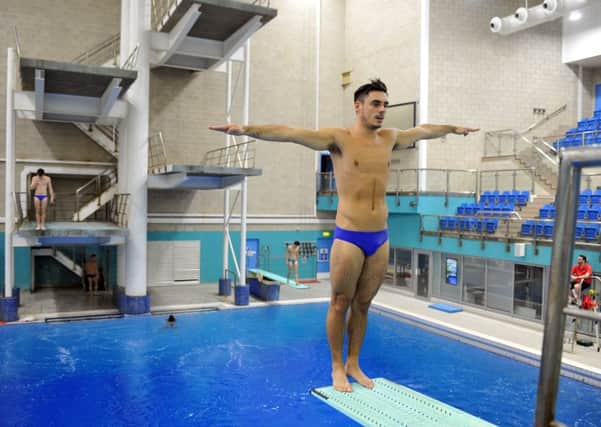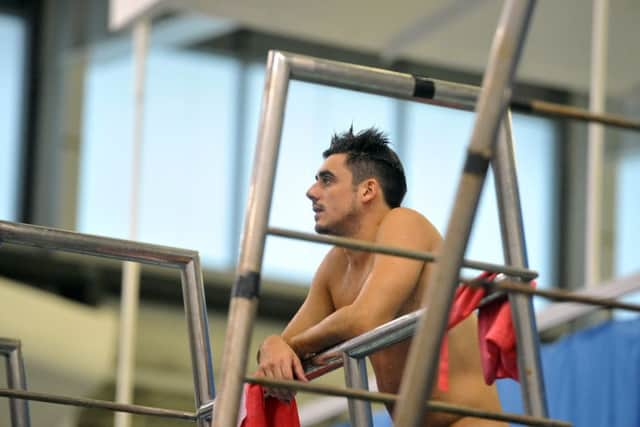Weekend Interview: Golden boy Chris Mears winning his mental battle


The envy of their peers, role models to the next generation, they have reached the very pinnacle of their sport after years of dedication and sacrifice.
It should be a time for floating on air, for enjoying all the benefits that a gold medal around your neck brings.
Advertisement
Hide AdAdvertisement
Hide AdBut for Chris Mears, the title of Olympic champion is one that he is still to adjust to, and one that has taken him on a completely different path altogether.


“It almost feels like you fall off a cliff,” says a 25-year-old who has made a living out of tumbling backwards off a 3m diving board.
“For me, it was kind of where do you go next when you’ve achieved what you’ve always wanted to achieve, and more than?
“I had always wanted to win an Olympic medal. It was always possible to win gold going into Rio but I didn’t think it was likely.
Advertisement
Hide AdAdvertisement
Hide Ad“So, after I’d done it, I was left asking myself whether that was the best feeling I’d have in my whole life, and if so, what would I be doing now?”


To add some perspective to the challenge Mears was faced with, you have to step back in time a few years.
Mears was a young diver from Reading whose promising career was nearly over before it had truly begun when in 2009 he suffered a ruptured spleen in training for the Youth Olympic Festival in Sydney and slipped into a coma.
The 15-year-old was given a five per cent chance of survival. Being told he would never dive again was the least of his problems.
Advertisement
Hide AdAdvertisement
Hide AdBut, with the support of his family, he made a full recovery and three years later secured an Olympic debut in London, finishing ninth.


A new synchro partnership with a teenager from Harrogate named Jack Laugher began in 2013 and quickly blossomed, with Mears relocating to Leeds at the start of the following year.
Together, and as part of a strong set-up at the City of Leeds Diving Club, Mears and Laugher’s career accelerated to the point where they headed to the Rio Olympics in 2016 as outside bets for a medal in the 3m synchro.
That they won gold, becoming the first British divers in history to take an Olympic title and took everyone, including themselves, by surprise.
Advertisement
Hide AdAdvertisement
Hide AdLife changed instantly and Mears’s first instinct was to be swept along in the moment.


“I felt pretty liberated, so I spent a couple of months in Los Angeles letting my hair down and having fun,” he says.
“Then when I got home and was having to make lunch and make myself a cup of tea, everything suddenly felt very mundane.”
That is when his mental health began to deteriorate.
“It was a really weird thing,” Mears reflects now.
“You can go either way after an Olympic gold, but you’re definitely going to take a certain direction because things aren’t going to stay the same for you when something that big that you care about so much happens.
Advertisement
Hide AdAdvertisement
Hide Ad“I had a really big dip in terms of my mental state, my mental health.
“It took a long time to get over. I wasn’t feeling very well until only a few months ago, just trying to comprehend the Olympics and my journey.
“Life changes dramatically, in a number of ways. The first being ‘I’m now Olympic champion’ which still feels a little bit weird to say out loud.
“It led to me not enjoying the sport fully last year; I was carrying injuries and I had a negativity about the sport, when, usually, I’m a very positive person.”
Advertisement
Hide AdAdvertisement
Hide AdHe was not alone in feeling a little lost. His synchro partner and housemate Jack – who pre-Rio had joked that they had envisaged hanging their Olympic medals on the wall of their house – also struggled to come to terms with the enormity of the accomplishment.
“Jack did dip, but he came back up quite quickly and it just took me a little bit longer to come round,” continues Mears. “Jack was a good help, and always has been, as I am to him. We’re very good friends, we know each other very well and we can always tell when the other is a bit off.”
Asked to elaborate on how the mental health problem manifested itself, Mears declines.
Getting these feelings off his chest may have proven a cathartic experience, but there are some thoughts that are better left unsaid.
Advertisement
Hide AdAdvertisement
Hide Ad“For me, I just want to keep the conversation about mental health going, to raise awareness, rather than make it about me,” he says.
Actions speak louder than words for Mears. Sensing he would not be alone in a sporting world becoming more open about mental health issues, he started turning his own experiences into lessons for others to take away.
“I did a video with one of my sponsors, Bridgestone, around mental health and people who have anxieties,” he says.
“We were able to get some amazing, incredible people who suffer from anxiety and fear to jump off a 10m diving platform, which you’d never think would happen.
Advertisement
Hide AdAdvertisement
Hide Ad“I see things like that, giving back to people who see me as a public figure to be inspired by, as part of the legacy I want to leave.”
Sharing his problems has proven to be good counselling for Mears, while the camaraderie at the City of Leeds Diving Club helped him through some of the darker moments.
“We have an amazing culture of being friends and pushing each other,” adds Mears. “We sit down every single week and say who we think has slacked off, we have got jobs we give each other like stocking the fridge with milk, we take turns cleaning the gym.
“If you don’t do you job properly you get called out in front of everyone. That keeps you grounded but also keeps your head up.”
Advertisement
Hide AdAdvertisement
Hide AdEven the transition of coaches from long time mentors like Ady Hinchliffe and Edwin Jongejans, to Adam Smallwood and Marc Holdsworth, has not seen the culture of success at the John Charles Aquatics Centre dissipate.
When they fly to the Gold Coast of Australia for next month’s Commonwealth Games, Mears and Laugher will do so as part of a seven-strong contingent from the Leeds club, accounting for more than 50 per cent of Team England’s divers Down Under.
Mears goes there refreshed, having come through the dark times.
“I feel positive, inspired and motivated again, which is really nice to be able to stand here and say after a difficult few years,” he reveals. “I go to the Commonwealth Games wanting to hit a certain score, whether that’s good enough for a medal or not that’s okay.
“The most important thing for me is I’ve found that love for the sport again.”